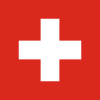This article may require cleanup to meet Wikipedia's quality standards. The specific problem is: Refs must be updated and using the same format and language. (September 2019) |
| Languages of Switzerland | |
|---|---|
 | |
| Official | German, French, Italian, Romansh |
| National | |
| Vernacular | Swiss German, Swiss Standard German, Swiss French, Swiss Italian, Franco-Provençal, Lombard, Walser German, Frainc-Comtou, Bavarian |
| Immigrant |
|
| Foreign | English |
| Signed | Swiss German Sign Language, French Sign Language, Italian Sign Language[1] |
| Keyboard layout | |
| Source | FSO[2] |
| Part of a series on the |
| Culture of Switzerland |
|---|
 |
| People |
| Languages |
| Mythology and folklore |
| Cuisine |
| Festivals |
| Literature |
| Music |
| Sport |
The four national languages of Switzerland are German, French, Italian, and Romansh.[3] German, French, and Italian maintain equal status as official languages at the national level within the Federal Administration of the Swiss Confederation, while Romansh is used in dealings with people who speak it.[4] Latin is occasionally used in some formal contexts, particularly to denote the country (Confoederatio Helvetica).[5]
In 2020, 62.3% of the population of Switzerland were native speakers of German (either Swiss or Standard German) at home; 22.8% French (mostly Swiss French, but including some Franco-Provençal dialects); 8% Italian (mostly Swiss Italian, but including Lombard); and 0.5% Romansh.[6] The German region (Deutschschweiz) is roughly in the east, north, and centre; the French part (la Romandie) in the west; and the Italian area (Svizzera italiana) in the south. There remains a small Romansh-speaking native population in Grisons in the east. The cantons of Freiburg, Bern, and Valais are officially bilingual; Grisons is officially trilingual.
English is widely spoken as a second language across Switzerland, and many Anglophone migrants live in Switzerland. It is often used as a lingua franca as Switzerland as Switzerland has four official languages. Because of this, English is often used in advertisements in Switzerland,[7] and many businesses and companies in Switzerland, even if they only operate domestically, have names that use English words.
- ^ [1] Archived 10 April 2009 at the Wayback Machine
- ^ "Sprachen 2015" (in German, French, and Italian). Neuchâtel, Switzerland: Federal Statistical Office FSO. 31 January 2017. Retrieved 13 June 2017.
- ^ "SR 101 The Federal Constitution of the Swiss Confederation of 18 April 1999 (Status as of 12 February 2017): Art. 4 National languages". The portal of the Swiss government (Federal Law collection). Berne, Switzerland: The Federal Council. 12 February 2017. Archived from the original on 23 October 2014. Retrieved 13 June 2017.
- ^ "SR 441.1 Bundesgesetz über die Landessprachen und die Verständigung zwischen den Sprachgemeinschaften [Federal Act on the National Languages and Understanding between the Linguistic Communities] (Sprachengesetz, SpG) vom 5. Oktober 2007 (Stand am 1. Januar 2017): Art. 5 Amtssprachen". The portal of the Swiss government (Federal Law collection) (in German, French, Italian, and Romansh). Berne, Switzerland: The Federal Council. 1 January 2017. Retrieved 13 June 2017.
- ^ "Languages of instruction in Switzerland - Daily Research". www.dailyresearch.co.uk. Daily Research. Archived from the original on 21 May 2022. Retrieved 20 January 2022.
- ^ "Languages". Office Federal Statistical. Retrieved 7 July 2022.
- ^ https://www.researchgate.net/publication/241736163_English_as_a_Cultural_Symbol_The_Case_of_Advertisements_in_French-Speaking_Switzerland
